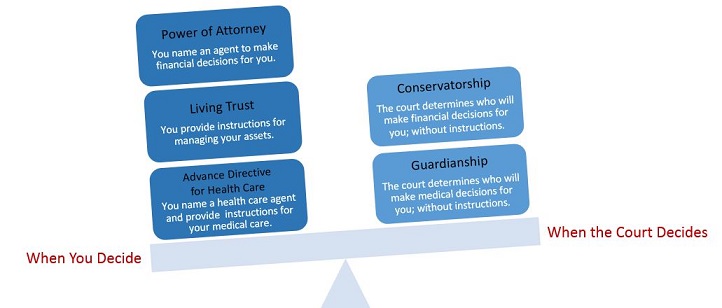When It Comes to Estate Planning, Indecision IS a Decision (One You May Not Like)
You’ve heard it a hundred times: If you have children, own a home, or have other significant assets, it’s important to have a will, a power of attorney, and other estate planning documents. Why is this? It is to ensure the protection of you and your loved ones and the preservation of your hard-earned money.
A basic estate plan includes a will, in which you make choices about how your assets will be distributed after you are gone. In the absence of a will, the state makes these decisions for you through the law of intestate inheritance, and, as described below, the results likely are not what you would choose for your family.
For a married couple without a will, for example, Georgia law states that a surviving spouse is entitled to a “year’s support” from the estate. This is an amount that is sufficient to meet the needs of the surviving spouse and any minor children for one year. Apart from the year’s support, the law of intestate inheritance divides the estate between the surviving spouse and the children of the deceased spouse. For a married couple with one child, if one spouse dies, all of the assets that pass through the estate apart from the year’s support are split evenly between the surviving spouse and the child.
If the couple has two or more children, the surviving spouse receives the year’s support and only one-third of the assets, with the other two-thirds split evenly among all the children of the deceased spouse. This can leave a surviving spouse with much less than expected or intended.
When the children inheriting these assets are minors, the court generally will appoint the surviving parent as conservator for the children. That parent will then be required to make annual reports to the court about how the children’s money is being managed.
At the age of 18, any assets inherited by a child are placed under the child’s exclusive control. There is no limitation that these funds be used toward education, nor that they be spent over a number of years. Those types of limitations can be enforced if assets are left by will to the surviving spouse or in trust to the children, but without any estate planning, the inheriting teenagers are free to spend as they wish.
While some assets can be removed from the control of the intestate inheritance laws through joint ownership and the designation of beneficiaries on accounts, it is essential to have an overall estate plan to make sure that your assets will be distributed to whom you want, the way you want, and when you want.
Apart from the distribution of assets, there are other important directions that can be accomplished only through a will. For example, a will is the only way for parents to name a guardian for their minor children after they are gone. By appointing a guardian, parents ensure that their children will live with the caregiver they choose, and they eliminate potential disagreements among surviving family members.
A will is also the only means to appoint a trusted person to serve as the executor of one’s estate. Appointing an executor can prevent squabbling among family members or the need to compensate an administrator that is appointed by the court.
If you made a will years ago, it is important to review your estate plan with an attorney to make sure it addresses your needs and intentions as of today. This is especially true if you have since married, had children, divorced, moved to a different state, or accumulated significant assets. You should also make sure that your will and other planning documents comply with current law.
Through a power of attorney, you are able to designate a trusted person to handle your business affairs and/or medical decisions when you are incapacitated and unable to do so yourself. Whether the disability is temporary or permanent, it is important to have a power of attorney in place so that these decisions can be made in a timely way.
In the absence of a power of attorney, a formal court hearing and appointment of a guardian and conservator is required. This is a public process that is both expensive and time-consuming.
By taking control of the estate planning process with the right choices for you and your family, you prevent the state’s default settings from leading to unintended and unnecessarily costly results.







